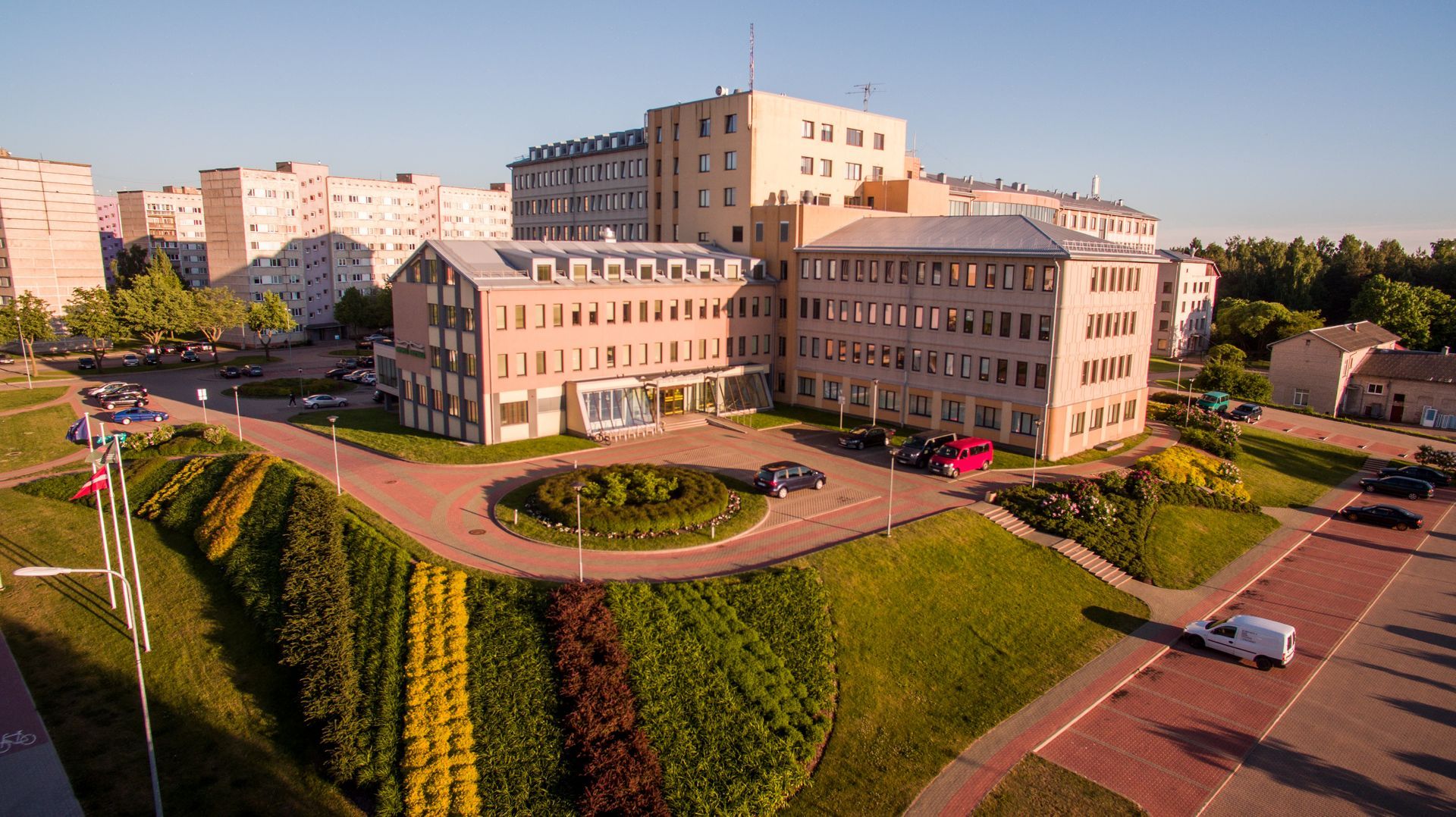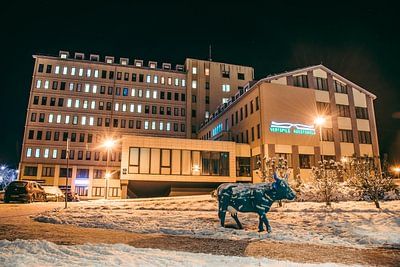When knowledge becomes outdated: research seeks solutions for effective lifelong learning
Ventspils University of Applied Sciences, together with partner universities, has joined a national research program project called "Elaboration of evidence-based solutions for effective professional competence development of adults and assessment of the transfer of its results into practice in Latvia."
Project participants Zane Zonberga and Sanita Lasmane, guest lecturers at Ventspils University of Applied Sciences, spoke about their work on the project, outlining the nature of the problem and possible solutions.
Rapid changes require new skills
The importance of this project will be appreciated by anyone who has ever thought about how much their profession has changed in recent years – whether the knowledge and skills acquired at school twenty, ten or five years ago still meet the requirements of today's job market? Rapid changes in society, automation of production, and the development of modern technologies, including artificial intelligence, require workers in many fields to constantly learn new skills to remain competitive in a changing job market. In this context, high-quality professional development for adults is of great importance, which is also clearly defined in Latvia's National Development Plan 2021-2027 as part of Latvia's sustainable development strategy to strengthen the country's ability to adapt to the changing labor market. In reality, adult education often lags behind the declared goals. To reduce this gap, a national research program project is currently being developed. Development of evidence-based solutions for the effective improvement of adult professional competence and evaluation of the transfer of its results into practice in Latvia (No. VPP-IZM-Education-2023/4-0001). The lead partner is the University of Latvia, but partner universities – Ventspils University of Applied Sciences and RTU Liepāja Academy – also play an essential role in the project.
Zane Zonberga is a second-year doctoral student in the joint doctoral program in Economics and Entrepreneurship at Ventspils University of Applied Sciences, Vidzeme University of Applied Sciences, and RTU Rezekne Academy of Technologies. At the same time, Sanita Lasmane has already completed her theoretical studies in this program and is preparing to obtain her doctoral degree at the end of this year. The title of Sanita Lasmane's doctoral thesis is Analysis and Modelling of Factors Affecting the Latvian Labour Market, while Zane Zonberga is working on a doctoral thesis on The Impact of Human Capital Development on Organisational Performance in Latvia, which is related to the theme of this project. In addition to the two young researchers, the project team at Ventspils University of Applied Sciences also includes the project's scientific director, Professor Una Libkovska, Associate Professor Liene Resele-Dūšele, and coordinator Linda Ūdre.
"I can try to explain the project's goal in the simplest way possible with an example: a person acquired a certain level of education, technical knowledge, and digital skills five or ten years ago, but now this knowledge has very little value in the labor market due to rapid digitization, technological development, and automation," says Zane Zonberga. "Many jobs are at risk because employees are simply unable to keep up with these trends. In our project, we aim to demonstrate that adult education is not only essential for the population but also crucial for companies to thrive and compete globally. We strive to offer companies and government institutions the opportunity to evaluate the practical application of knowledge, assessing whether the learning process meets their quality standards and whether it will benefit their employees. The project also emphasizes the role of professional development for teachers so that they can provide students and adults with modern, practical knowledge and skills that are relevant to the labour market.
Professional development is relevant in almost all professions, but it is particularly appropriate for those working in fields where digitization, automation, artificial intelligence technologies, etc., are rapidly advancing. For example, customer support specialists whose work is being replaced by artificial intelligence chatbots, or warehouse workers whose tasks are being taken over by automated lines. More generally, this also applies to employees in any industry who acquired technical or digital skills five or ten years ago.
From interviews to cooperation solutions
The project is divided into five task packages, which involve both data collection and analysis. One of the tasks of the researchers at Ventspils University of Applied Sciences, together with their project partners, was to analyze 14 focus group interviews conducted with industry representatives, expert councils, government and educational institutions, and other target groups. The interviews are transcribed, coded and analyzed using both quantitative and qualitative research methods. In addition, researchers at Ventspils University of Applied Sciences have assessed the contribution to human capital development, including adult vocational education and professional development, and its impact on the Latvian economy and economic development. Theoretical reviews of the effects of human capital development on the development of the national economy and the characteristics of instruments for measuring the effectiveness of the transfer of professional development into practice have also been carried out.
Researcher Sanita Lasmane reveals that, before her involvement in this project, she had worked mainly with quantitative research methods, which focus on the collection and analysis of numerical data. "This project focuses more on qualitative research methods, which are used to study something difficult to measure in numbers, such as people's attitudes and opinions on a particular issue. Qualitative research methods require a greater ability to delve into context and interpret nuances, which has personally allowed me to broaden my research horizons and become more versatile," Sanita Lasmane shared her experience.
One of the main objectives of the project is to develop a practical tool that would help assess the effectiveness of transferring knowledge gained through adult professional development into practice. This tool would enable companies and government institutions to determine whether the training provided equips employees with the necessary skills and is applicable in the job market. In the long term, the project's desired outcome would be closer and better cooperation between educational institutions, entrepreneurs, and government agencies, with company representatives actively involved as guest lecturers, telling students about real problems and needs in the job market.
The offer is there, but information is lacking
Zane Zonberga shared one of her observations from the research process, acknowledging that "There is fragmentation in communication between the institutions involved – employees, employers, local governments, the state, and, accordingly, educational institutions and state-level institutions. Fragmented communication between these parties has created obstacles to better cooperation." She emphasizes the importance of employers identifying their employees' needs, but notes that some companies struggle to do so effectively without consuming excessive human resources time. It is in the interest of local governments to ensure that companies in their municipalities have the opportunity to develop and provide support as needed. The industry expert council is responsible for obtaining information about the needs of all industries – the knowledge, skills and competencies that need to be developed. The state is responsible for providing not only projects, but also further professional development courses, training, etc., which would be offered to both industries and residents. Zane Zonberga cites the example of the courses provided by the State Employment Agency, emphasizing: "After communicating with entrepreneurs and industry representatives, it was concluded that this offer, which usually comes from the state, does not always match the knowledge, skills or competencies they need. Similarly, various projects are currently challenging for a specific company to implement, as they often do not meet one or two criteria and are therefore not eligible for funding. These communication issues need to be resolved so that all parties understand what is needed and how to implement it."
Zane Zonberga acknowledges that the current range of professional development opportunities is sufficient. Still, some shortcomings need to be addressed: "I would say that the range of professional development opportunities as such is sufficient, but at the moment the public is not sufficiently informed about the possibilities." For example, at Ventspils University of Applied Sciences, anyone who is interested can take courses and earn credits for a fee, receiving a certificate upon completion. This can be done over several years, combining work with study and gradually acquiring knowledge. Similar offers are also available at other educational institutions and lifelong learning centres, including free courses, but their availability often depends on the initiative of the teachers themselves.
Sanita Lasmane highlights the inequality between regions: "Opportunities exist, but they are mainly concentrated in the more economically developed areas. The biggest structural gaps in the labor market are precisely in the regions where professional development opportunities are much more limited." Zane Zonberga agrees: "There are many more opportunities for professional development in Riga, and they are more diverse. For example, Ventspils University of Applied Sciences is unable to provide professional development in medicine, but such opportunities are available in Riga."
Cooperation with entrepreneurs must be expanded.
The researchers particularly emphasize the importance of cooperation with businesses. Ventspils University currently cooperates with Bucher Municipal, where, in addition to the scholarship, students are also provided with the opportunity to gain experience at the company by familiarizing themselves with all work processes: "I think it is necessary to establish broader cooperation so that it is not just two or three companies and so that entrepreneurs themselves want to give guest lectures to students on current labor market issues. Ventspils University is already succeeding in this because some of the representatives of Ventspils companies are graduates of Ventspils University of Applied Sciences, and better communication has been established with them, so their desire to get involved in the process is noticeable," says Zane Zonberga. " Ventspils University of Applied Sciences already attracts various industry experts and company representatives for guest lectures and practical classes, but I believe that cooperation should be even broader."
The project Development of Evidence-Based Solutions for Effective Professional Competence Improvement for Adults and Assessment of the Transfer of Results into Practice in Latvia was launched in December 2023 and is scheduled to be completed in December 2026. The results of the project will be used in dialogue with the Ministry of Education and Science, which is the primary end user and client of the project.
Source: https://www.ventasbalss.lv/zinas/izglitiba/52693-kad-zinasanas-noveco-petijuma-mekle-risinajumus-efektivai-muzizglitibai
Photo: Krists Kūla
Share on other platforms
Other news







